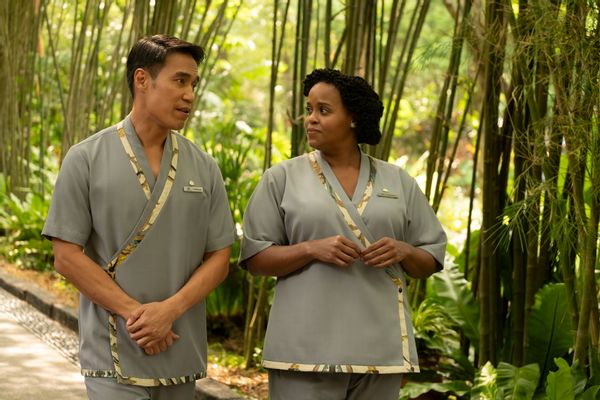Is the parent company of The White Lotus luxury resorts publicly traded? Mike White may not have the answer to that question, or perhaps he does. Either way, the overthinkers are right to wonder how it is that three of its hotels can become separate murder scenes within a brief timespan without the brand's stock taking a reputational hit.
Then again, has anyone noticed these crimes? Not likely. Every season of “The White Lotus” studies Western solipsism, the American strain in particular. Bad things happen, that mode of thinking goes, and as long as it’s not happening to me, it’s somebody else’s mess to clean. Tragedies are for small people. The world keeps turning regardless. This is a selfish way to glide through life, and it also describes the dominant philosophy of the idle rich, especially when the ruling class goes on vacation with their princes and princesses in tow.
Blessedly, Season 3 makes room for glimpses into the locals’ lives beyond the hotel, augmenting the personal stakes for workers beyond the usual administrative staff whose prickliness co-stars in previous seasons.
We love watching the rich behave badly and get their just desserts for abusing the help. But that dynamic can grow tiresome, even with more than a year’s pause between new seasons. Wisely, White evolves this viewpoint with each fresh turn, fine-tuning parts to fit each new environment and lending additional insight and sympathy to those catering to their underappreciative visitors.
Setting the third season in Thailand allows him to rectify previous shortcomings in his story arcs or, conversely, risks tumbling into old traps. The Hawaiian season, its first, minimizes the individual personality of the island's Indigenous employees to focus on the white vacationers. Natasha Rothwell’s spa manager Belinda is the sole character whose emotional trials are explored with nuance and intricacy.
In Thailand, it’s mostly the white guests who are in the minority and out of step with the environment despite its intoxicating beauty and serenity. Even Belinda, who returns this season to participate in a management exchange program, gets a good jump-scare from a chance encounter with one of the locale’s four-legged denizens. This shock vanishes as quickly as it comes since Belinda immediately melds with the Thai staff’s dedication to caring and connecting with people.
At the Hawaiian branch, that focus drains her. Here we see how the staff’s service to each other and their guests can be nourishing in ways beyond the implied requirements of their uniform.
“Thai people believe that spirits are everywhere, so we give them offerings for good luck and protection,” explains Pornchai, Dom Hetrakul’s welcoming spa manager, to his American counterpart as they consider one of the hotel’s spirit houses. These shrines laden with incense, flowers and other offerings sanctify its gardens, waters and the surrounding landscape, and they highlight the psychic malaise dominating most of its visitors.
 Dom Hetrakul and Natasha Rothwell in "The White Lotus" (Fabio Lovino/HBO)
Dom Hetrakul and Natasha Rothwell in "The White Lotus" (Fabio Lovino/HBO)
White has trained viewers to hold certain expectations for each new season, and six out of the eight episodes made available for review exceed the elevated bar of its Italy season. You can get as drunk on the cinematography as the cocktails everyone’s enjoying, which is on purpose; the artwork, accessories and even the walls tell a story. The waters surrounding each resort tell the place’s unique tale and steadily scrub the veneers off each person. In Thailand, the action is veiled in the jungle’s mist and lush greenery visitors see as magical, or perhaps threatening, but are a part of life for the people who live there.
White has honed his vacationers’ personalities to a scientific formula.
Blessedly, Season 3 makes room for glimpses into the locals’ lives beyond the hotel, augmenting the personal stakes for workers beyond the usual administrative staff whose prickliness co-stars in previous seasons.
Instead, we empathize with the accommodating and humble security guard Gaitok (Tayme Thapthimthong), a polite local villager who holds a torch for the kindhearted Mook (Lalisa Manobal), one of the spa’s many “health mentors,” its version of premium guest concierges. Gaitok’s crush on Mook isn’t entirely unrequited, but next to the burly security guards constantly flanking the hotel’s glamorous owner Sritala (Lek Patravadi) he’s a scrawny underdog.
We need your help to stay independent
You might notice the meta-layer White injects into their courtship story by casting Manobal, a member of Blackpink colloquially known as Lisa. She might be the most familiar Thai performer in the cast, although Thapthimthong’s character is more thoroughly developed than Manobal's dream girl. But recognizing the K-pop superstar's status automatically puts a thumb on the compassion scale for Thapthimthong's front gatekeeper. The story scripts them as social equals, but the audience knows Lisa's well out of this man's league.
White has honed his vacationers’ personalities to a scientific formula, with this season’s terrible family played by the Ratliffs, a brood of North Carolinians headed by wealthy businessman Timothy (Jason Isaacs) and blithely self-medicating wife Victoria (Parker Posey, affecting a drawl that’s half southern patrician and half wine-drunk).
They’re the type of couple convinced that their way of life is a universal standard, thinking to which their arrogant eldest Saxon (Patrick Schwarzenegger) wholeheartedly subscribes without any false politesse. Their younger son Lochlan (Sam Nivola) and daughter Piper (Sarah Catherine Hook) are somewhat embarrassed by their parents and brother, but mainly Saxon, who views the world as an endless buffet of things and people waiting to be screwed.
 Aimee Lou Wood, Charlotte Le Bon and Patrick Schwarzenegger in "The White Lotus" (Fabio Lovino/HBO)
Aimee Lou Wood, Charlotte Le Bon and Patrick Schwarzenegger in "The White Lotus" (Fabio Lovino/HBO)
Meeting Aimee Lou Wood’s Chelsea bewilders him since he can’t understand how this attractive, scantily clad British girl would turn her nose up at his beefcake in favor of Rick (Walton Goggins), a bedraggled middle-aged guy perpetually stewing in a sour mood.
These types are one means by which the third season solidifies a few unifying constants across the series. Surely as the problems its families and couples think they’ve left behind catch up to them, others that have been long-gestating are coaxed into view by the warm atmosphere and relaxed inhibitions. These materialize in ways that lend unexpected mournfulness to some figures and, to others, a squeamishness that’ll make your skin crawl.
Want a daily wrap-up of all the news and commentary Salon has to offer? Subscribe to our morning newsletter, Crash Course.
The setting allows White to indulge in commentary about misguiding Western hierarchal assumptions, primarily turning up in the form of old bald white men shacking up with young women from Thailand or elsewhere. The main arcs mostly steer clear of this version of exoticizing, even in this subplot, by focusing on a couple of grudging vacation buddies who brought their younger halves to Asia with them, Rick being one.
White also reprises some of the giddy crankiness he enjoys writing for his female characters, this time through a reunion between three lifelong friends played by Carrie Coon, Leslie Bibb and Michelle Monaghan.
They claim to share a sisterhood but whose dissimilar economic and social statuses rocket to the surface like freshly uncorked champagne bubbles. Their envy does pour out immediately but strains forth bit by bit, pressing through the narrow gaps in their bleached smiles.
Like everyone else, they eventually have a motive to kill, or a reason to be killed, but before converging on that inevitable when a body shatters this placid bubble, the story takes us on a gratifying pleasure tour inviting us to smell the blossoms and note how gorgeously they’re wilting under the weight of self-indulgent egomania.
“Everyone runs from pain towards pleasure, but when they get there, only find more pain,” somebody observes. “You cannot outrun pain.” True. But this new season of “The White Lotus” helps to blunt ours with an alluring, thoughtful excursion into privileged people's problems, including whatever it is that’s passing for their souls.
"The White Lotus" returns at 9 p.m. Sunday, Feb. 16 on HBO and streams on Max.



Shares